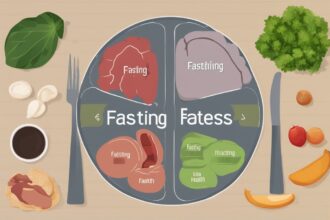The liver plays a critical role in detoxification, metabolism, and overall wellness, but modern lifestyles often burden this vital organ with toxins and fat accumulation. Exploring Fasting And Liver Health Fasting For Health offers a promising avenue to support liver function naturally. This practice harnesses the power of controlled abstaining from food to promote repair, reduce stress on the liver, and enhance its efficiency. In this post, we dive into how this approach can benefit hepatic health and provide actionable strategies for incorporating it into your routine.
How Fasting Supports Liver Wellness
The concept of using fasting to bolster liver wellness centers on giving the organ a much-needed break from constant digestion and processing. When we eat frequently, the liver is continuously engaged in metabolizing nutrients, storing energy, and filtering toxins. By practicing periods of abstaining, the body shifts its focus to repair and regeneration, allowing the liver to prioritize detoxification over digestion [1]. This rest can help reduce inflammation, a common issue in conditions like fatty liver disease, and promote cellular repair mechanisms such as autophagy, where damaged cells are cleared out. Additionally, fasting can lower insulin levels, which in turn reduces fat storage in the liver, a key factor in maintaining hepatic health. For those new to this practice, starting with shorter durations and gradually increasing the fasting window can be a sustainable way to ease the body into this restorative process. Learn more about related health strategies at Fasting Guide: Boost Liver Health With Smart Tips.
Intermittent Fasting for Liver Repair
Intermittent fasting, a popular approach within the realm of Fasting And Liver Health Fasting For Health, involves cycling between periods of eating and abstaining. This method has shown significant promise in supporting liver repair by reducing oxidative stress and improving lipid metabolism [2]. For instance, the 16:8 method—fasting for 16 hours and eating within an 8-hour window—can help decrease liver fat accumulation, a major concern in non-alcoholic fatty liver disease (NAFLD). During fasting periods, the body taps into stored fat for energy, which directly reduces the fat burden on the liver. Moreover, this practice enhances the production of ketones, which have anti-inflammatory properties that further aid hepatic repair. Imagine discovering a simple daily routine that not only boosts energy but also rejuvenates your liver over time. Starting with a 12:12 schedule can be an accessible entry point before progressing to more intensive fasting regimens. Curious about other health benefits? Check out Control Blood Sugar With Fasting: Practical Tips.
Benefits of Fasting on Liver Function
The advantages of incorporating fasting into your lifestyle extend deeply into liver function improvement. One of the most notable benefits is the reduction of liver fat, which is critical for preventing and managing conditions like NAFLD [3]. Fasting also supports better insulin sensitivity, which helps regulate blood sugar and reduces the risk of fat buildup in the liver. Additionally, it promotes autophagy, a cellular cleanup process that removes damaged components and supports liver regeneration. Here are some specific benefits tied to this practice:
- Decreased liver inflammation through reduced oxidative stress, a key factor in chronic liver conditions.
- Improved metabolic health by lowering insulin resistance, which directly impacts liver fat storage.
- Enhanced detoxification as the liver gets a break from constant food processing, allowing it to focus on clearing toxins.
- Support for weight management, which indirectly benefits liver health by reducing overall body fat.
These outcomes highlight why many are turning to fasting as a natural way to care for their liver. For deeper insights, explore How Fasting Reduces Liver Fat Naturally.
Fasting Strategies for Hepatic Health
Adopting effective fasting strategies is essential for optimizing hepatic health. One approach is time-restricted eating, where meals are consumed within a specific window each day, such as 10 a.m. to 6 p.m., allowing the liver extended periods of rest. Another strategy is the 5:2 method, which involves eating normally for five days and significantly reducing calorie intake (around 500-600 calories) on two non-consecutive days of the week. This can help lower liver enzyme levels, indicating reduced stress on the organ [4]. Hydration is also crucial during fasting periods—drinking plenty of water supports detoxification processes. Additionally, pairing fasting with a nutrient-dense diet during eating windows, focusing on foods like leafy greens, berries, and healthy fats, maximizes benefits for the liver. For beginners, consulting a healthcare provider before starting any fasting regimen ensures safety, especially for those with pre-existing conditions. Interested in related topics? See Can Fasting Help Control Blood Sugar? A Deep Dive.
Impact of Abstaining on Liver Detox
What is Fasting And Liver Health Fasting For Health, and how does it influence liver detoxification? This practice directly impacts the liver’s ability to cleanse the body by reducing the workload associated with digesting frequent meals. When food intake is paused, the liver can focus on breaking down stored fats and eliminating accumulated toxins more effectively [5]. This process is particularly beneficial in combating the effects of poor dietary habits or environmental exposures that burden the liver over time. Abstaining from food also triggers a reduction in triglycerides, which, when elevated, contribute to liver fat buildup. Imagine finding a natural method that enhances your body’s detox system without relying on supplements or extreme diets. To support this process, avoid overeating during non-fasting periods, as it can counteract the detox benefits. Staying consistent with a fasting routine, even if it’s just a few days a week, can yield noticeable improvements in how efficiently the liver operates. For additional resources, visit Smart Fasting Tips for Liver Health.
Fasting Guide for Better Liver Care
Navigating the world of fasting for liver care requires a practical and informed approach. This fasting guide offers actionable steps to ensure you’re supporting your liver effectively. Start by choosing a fasting method that suits your lifestyle—whether it’s intermittent fasting or periodic longer fasts, consistency matters more than intensity. Focus on hydration, aiming for at least 8-10 glasses of water daily during fasting periods to aid detoxification. Here are some additional tips to enhance liver care through fasting:
- Begin with shorter fasting windows, such as 12 hours overnight, to acclimate your body.
- Incorporate antioxidant-rich foods like turmeric and green tea during eating periods to support liver function.
- Avoid processed foods and sugars, which can strain the liver even during non-fasting times.
- Monitor how your body responds, and adjust fasting duration if you experience fatigue or discomfort.
- Pair fasting with light physical activity, like walking, to boost metabolism without overtaxing the body.
By following these steps, you can harness the benefits of fasting to promote long-term liver wellness [6]. Always prioritize listening to your body and seek professional advice if you’re unsure about starting a new fasting routine.
This content is for informational purposes only; consult a healthcare professional.
References
- [1] Study on Fasting and Liver Health: Impacts on Detoxification, Journal of Hepatology, 2023
- [2] Research Article on Intermittent Fasting and Liver Repair, Nutrition Reviews, 2022
- [3] Clinical Trial on Fasting Benefits for Liver Fat Reduction, American Journal of Clinical Nutrition, 2021
- [4] Insights on Fasting Strategies for Hepatic Health, Liver International, 2020
- [5] Analysis of Fasting and Liver Detox Mechanisms, Frontiers in Physiology, 2019
- [6] Guide to Fasting for Liver Care, Health and Wellness Journal, 2024






